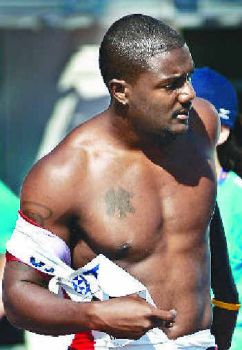Two Olympic sprinters who have served suspensions for using anabolic steroids are seeking redemption at the 2012 Summer Olympics in London. American sprinter Justin Gatlin and British sprinter Dwain Chambers hope to prove to the world that they can be legitimate Olympic champions without the use of steroids.
Both sprinters have proven they are still world-class sprinters worthy of a shot on the Olympic stage. Gatlin and Chambers won the gold and bronze medals, respectively, in the 60 meter sprint at the 2012 World Indoor Athletics Championships in Istanbul (Turkey) on March 10, 2012.
Gatlin’s and Chambers’ respective paths back to the Olympics could not have been more different. Gatlin has been welcomed back to the sport with open arms by USA Track & Field (USATF), the United States Olympic Committee (USOC) and the United States Anti-Doping Agency (USADA). The organizations have openly expressed support of Gatlin’s return to the Olympics.
By contrast, Chambers return to the Olympics is still in doubt. Chambers has received a startingly cold reception from the general public in Great Britan and a particularly hostile response from the British Olympic Association (BOA). It was Chambers’ return to the sport of track and field that prompted the BOA to issue a lifetime ban from Olympic competition for all athletes that have been suspended for steroid use.
The World Anti-Doping Agency (WADA) has informed the BOA that such a by-law amounts to double jeopardy and is in blatant violation of the WADA Code. BOA has vowed to take every measure necessary to fight WADA and prevent Dwain Chambers from competing in the Olympics on behalf of the United Kingdom. They have taken their case to the Court of Arbitration for Sports (CAS). The CAS is expected to issue a ruling on the legality of the BOA by-law (and by extension Chambers’ eligibility to participate in the 2012 Olympics).
While Gatlin has the unconditional and full support of USOC, Chambers has been treated like a leper by the BOA.
Ironically, Gatlin never admitted knowingly using anabolic steroids while Chambers took full responsibility for his use of banned steroids.
Gatlin, the 2004 Athens Olympics 100 meter gold medallist, tested positive for “testosterone” at a track meet in Lawrence (Kansas) on April 22, 2006. He equalled the 100 meter world record of 9.77 seconds a few weeks later at the IAAF Super Tour meet in Qatar. His world record performance was annulled after the results of the anti-doping test were announced. Gatlin was originally banned for eight years but this was subsequently reduced to four years due to his extensive cooperation with USADA.
Gatlin has consistently denied using steroids and blamed an unscrupulous masseuse for applying a testosterone-spiked cream during a massage.
By contrast, Chambers took full responsibility for his use of the designer steroid tetrahydrogestrinone (THG) obtained from Victor Conte of the Bay Area Laboratory Co-operative (BALCO). Anti-doping officials confirmed the presence of THG metabolites using a new test created by Don Catlin. The presence of THG was confirmed in both Sample A and Sample B on November 7, 2003.
Chambers has the noteworthy distinction of being the first athlete to test positive for THG. Chambers was banned for two years and stripped of all medals he had won since 2002.
The different treatment of previously suspended athletes who are seeking redemption at the 2012 London Olympic provides an interesting reflection on the nuances in the perception of steroid-using athletes by officials in the United States and Britain.
Gatlin is in control of his own destiny when it comes to the Olympics. Chambers needs a favorable ruling by the CAS and some leeway from the BOA to make his Olympic dream a reality.


Source:
AP. (March 10, 2012). Gatlin wins 60 meters at world indoors. Retrieved from http://sportsillustrated.cnn.com/more/news/20120310/track-and-field-world-indoors-justin-gatlin/index.html
Related Posts :
- Russian Athlete Tells Olympic Officials to Go to Hell After Testing Positive for Steroids
- Shotputter Adam Nelson May Receive Athens Gold After Winner Tested Positive for Steroids
- Officials Still Catching Steroid Users from the 2004 Athens Olympics
- Olympic Discus Thrower Loses Silver Medal After Testing Positive for Anabolic Steroids

